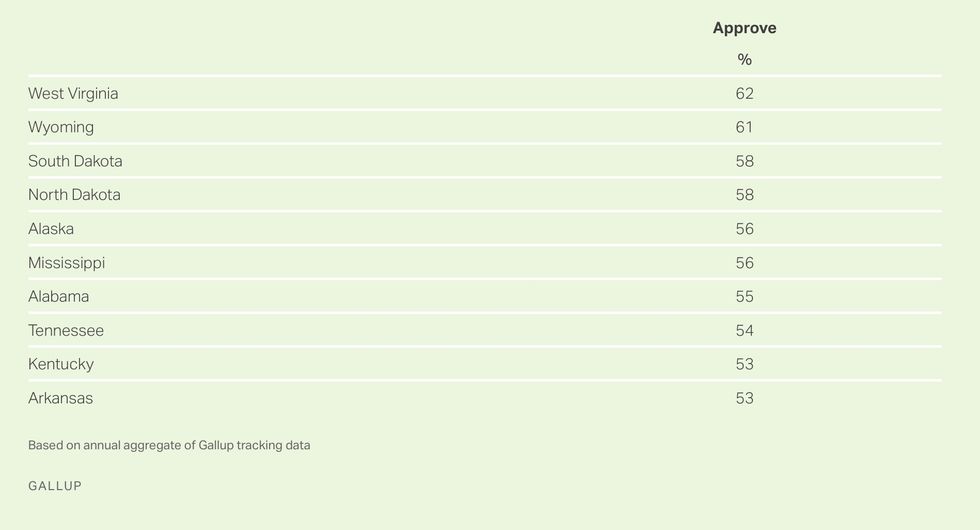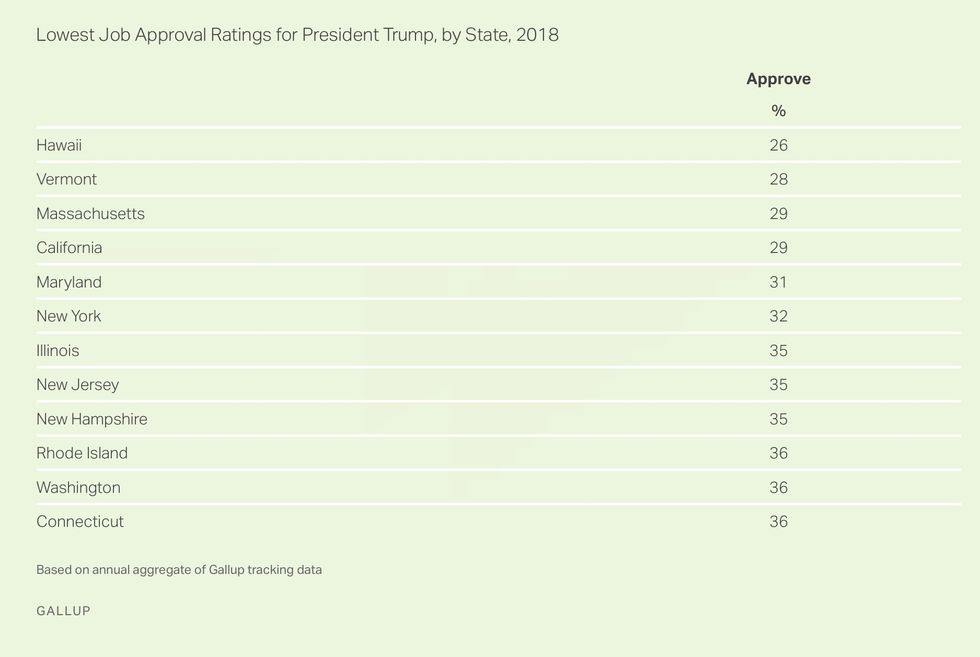WASHINGTON, D.C. -- President Donald Trump's job approval rating varied widely across the U.S. states in 2018, with 17 states giving him ratings of 50% or higher, and 16 states giving him ratings below 40%. The states most approving of Trump were generally in the South and Mountain West areas of the country, while he fared most poorly in New England and on the West Coast.In 2017, Trump had approval of 50% or higher in 12 states -- five fewer than in 2018 -- and approval below 40% in 17 states -- one more than in 2018. Those shifts reflect the modest improvement this past year in his approval ratings nationally, from 38% in 2017 to 40% in 2018.
The five states that moved to 50% or higher job approval last year were Missouri, Kansas, South Carolina, Mississippi and Utah.
Results are based on combined data from the 2018 Gallup tracking poll, encompassing interviews with more than 73,000 U.S. adults, including 500 or more in 38 states and 1,000 or more in 27 states. Each state sample has been weighted to match the demographic characteristics of that state's population to ensure it is representative of the state's residents. Full data for all 50 states are shown at the end of the article.
Although much can change between now and Election Day 2020, a job approval rating of 50% or higher would presumably put Trump in good position to win a state in the presidential election. The 17 states with 50%+ approval ratings account for a combined total of 102 electoral votes. In contrast, the states in which Trump has an approval rating below 40% account for 201 electoral votes.
In order to get to the 270 electoral votes needed to win the presidency, Trump would have to win all but one or two of the states in which his 2018 approval rating was between 41% and 49%. Some of the more challenging states to win from among this group, based on that approval rating, would be Texas (41%); Pennsylvania, Wisconsin and Michigan (all at 42%); and Arizona and Florida (43%). Trump won all of those states in 2016, and thus it is certainly possible that he can do so again. But he clearly has a lot of ground to make up in those states to get close enough to 50% that he can finish with more electoral votes nationwide than the Democratic candidate.
Trump's Ratings Best in West Virginia, Wyoming
West Virginia (62%) and Wyoming (61%) residents were most approving of Trump's performance in 2018 and were the only two states with ratings above 60%. South Dakota, North Dakota, Alaska, Mississippi and Alabama had the next-highest approval ratings for Trump, with Tennessee, Kentucky and Arkansas constituting the remainder of the top 10. All but Mississippi ranked among the top 10 states in 2017.
Trump's job approval ratings were lowest in Hawaii (26%) and Vermont (28%), with California and Massachusetts (each at 29%) also below 30%. The remainder of the bottom 10 includes Maryland, New York, Illinois, New Jersey and New Hampshire, with three states (Rhode Island, Connecticut and Washington) tied for 10th lowest.
The rank-order of Trump job approval in 2018 aligns with his performance in the 2016 presidential election. The states ranked first (West Virginia) through 30th (Texas) are the 30 states Trump won in 2016, while Trump lost every state ranked between 31st (a four-way tie between Oregon, Virginia, Nevada and Delaware) and 50th (Hawaii). Thus, it is unlikely Trump will win any states where his approval rating was not among the top 30 states in 2018.
Implications
Now that several Democratic politicians have announced their candidacies for the 2020 presidential election, the campaign gearing up. Trump's job approval ratings by state give a baseline estimate of how his re-election prospects stand from an Electoral College perspective. While his ratings in 17 states are high enough to suggest he has a good chance of winning those states in the presidential election next year, they tend to be smaller states and account for barely a third of the electoral votes he would need to win the presidency. A second Trump term will be won or lost in the larger states that he won in 2016 but had approval ratings in the low 40s in 2018. He cannot lose more than one or two of those states and still win the election, particularly because it appears unlikely that he would prevail in any state he did not win in 2016.
Increasing his approval rating by close to 10 percentage points in those key states seems like an uphill battle at this point, but several factors could make it possible. Recent polling suggests Trump's current job approval rating is already improved compared with where it was for much of 2018. If he can sustain those higher levels, presumably his approval ratings would be showing similar increases in most, if not all, states.
Second, differences in turnout by party could increase Trump's odds of winning in those states. For example, though Texas as a whole is relatively competitive in terms of party identification, Republicans continue to dominate in statewide elections there, perhaps because of lower participation among Hispanics. To the extent Republican voters in the key states participate at higher rates than Democratic voters, a Trump job approval rating in the mid- to high 40s may be enough to allow him to win those states.
Last, there are several examples when presidents who had nationwide approval ratings in the 40% range in the year before the election won a second term, including Ronald Reagan, Bill Clinton and Barack Obama. All managed to get to 50% approval by the time of the presidential election. Trump has yet to attain that level in his presidency, but he will have the next 20 months to get to there, and to make the case to Americans that he deserves a second term.
Jeffrey M. Jones, Gallup, February 22, 2019
###
Post Script. Gallup makes clear that if he is still in office, Trump can be stopped. #BlueWave202



